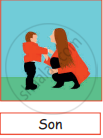Advertisements
Advertisements
प्रश्न
List the various ways of avoiding the errors mentioned in the passage.
उत्तर
The various ways of avoiding error mentioned in the passage are:
- Observation: make the observation yourself. Thinking that you know when in fact you don't is a fatal mistake.
- If an opinion contrary to your own makes you angry, that is a sign that you are subconsciously aware of having no good reason for thinking as you do. Whenever you find yourself getting. angry about a difference of opinion, be on your guard; you will probably find, on examination, that your belief is going beyond what the evidence warrants.
- Traveling is a good way of ridding oneself of certain kinds of dogmatism by becoming aware of opinions held in social circles different from one's own. It is also very profitable in diminishing the intensity of insular prejudice.
- Imagine an argument with a person having a different bias. You may grow less dogmatic and cocksure through realizing the possible reasonableness of a hypothetical opponent.
- Be very wary of opinions that flatter your self-esteem.
- Other passions (strong emotions) besides self - esteem are common sources of error. We often make mistakes when we are overwhelmed by emotions.
- Fear is the most common source of error. There are two ways of avoiding fear: one is by persuading ourselves that we are immune from disaster, and the other is by the practice of sheer courage. Poltroons are more prone to cruelty and superstition than brave men.
APPEARS IN
संबंधित प्रश्न
Explain the metaphor in the line: ‘Poets are the mirrors of gigantic shadows that futurity casts on the present’.
Describe the following with the help of the story.
Thiruvalluvar
Divide the story into different sections to show the different events and time periods in it. Give a suitable title to each section.
What did the husband want to do with the extra milk?
What did the father give to all the daughters?
________ was a young talented doctor.
Write the homophone for the given word and draw the picture.


Are you the first to protect the nature?
Do you think it is right for the tanker to take water? Why?
Read the following sentence.
‘A very wise man once remarked that of the unspoken word, you are a master; of the spoken word, you are a slave.’
The sentence has two pairs of opposites - spoken and unspoken, and master and slave. The contrasting ideas make the sentence more effective. Putting together opposite or contrasting ideas in one sentence is a literary device. It is called antithesis.
Read the following examples of antithesis.
- Give every man thy ear, but few thy voice.
- Man proposes and God disposes.
- Speech is silver, but silence is gold.
- Patience is bitter, but it has a sweet fruit.
